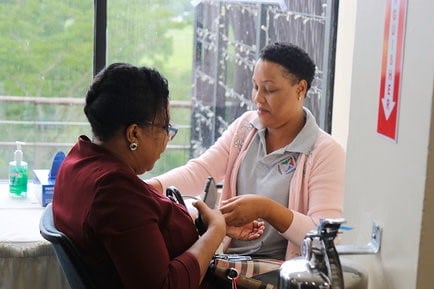Taking Health to Heart in Trinidad and Tobago
September 26, 2019

Prevention and management of high blood pressure can reduce heart attacks and strokes. Photo: PAHO
In July 2019 in a room packed with local healthcare workers in Port of Spain, Trinidad and Tobago, the nation’s Health Minister Terrence Deyalsingh made a somber forecast. “If we do not act now with vigor, with commitment, and with a robust response…we will not be able to build enough hospitals…[to keep pace with the country’s growing noncommunicable disease epidemic].”
Minister Deyalsingh was speaking at the launch of the Trinidad and Tobago (TT) Global Hearts Initiative, part of a global effort to reduce premature deaths and disabilities from heart disease and strokes.
Physical inactivity, unhealthy diets, and obesity are fueling a crisis of noncommunicable diseases, including heart disease, stroke, and diabetes in Trinidad and Tobago. Noncommunicable diseases account for four out of every five deaths in the Caribbean nation, with heart disease the leading cause of death.
HEARTS in the Americas
With the launch of the TT Global Hearts Initiative, the nation aims to strengthen primary healthcare systems and improve high blood pressure prevention and management. High blood pressure, or hypertension, is a leading risk factor for heart disease and stroke.
The TT Global Hearts Initiative applies the HEARTS technical package (HEARTS), a set of high-impact, evidence-based interventions developed by the World Health Organization, the Pan American Health Organization (PAHO), CDC, and other partners. HEARTS employs standardized treatment, lifestyle coaching, essential medicines, team-based health care, and monitoring systems to improve heart health. HEARTS is currently being locally adapted and implemented in 21 countries, including twelve countries in Latin America and the Caribbean.
Successful implementation in Latin America and the Caribbean is supported by a coordinated approach facilitated by PAHO. The approach prioritizes commitment from the ministry of health, collaboration with local stakeholders and leaders, consensus on standardized treatment protocols, and a systematic expansion strategy. PAHO provides program guidance and technical support through their country offices and a network of international experts.
Country-led HEARTS programs, like the TT Global Hearts Initiative in Trinidad and Tobago, have already reached over two million adults at 131 health centers throughout the Americas.

Healthcare workers lead by example, taking an active break during the TT Global Hearts Initiative launch. Photo: PAHO
Setting the Stage for Success
During the TT Global Hearts Initiative launch, primary healthcare workers and public health practitioners from across the country gathered to expand their knowledge of the initiative and discuss local implementation. Prior to attending the workshop, healthcare workers were encouraged to participate in a comprehensive virtual course on the HEARTS modules. The virtual course produced by PAHO enabled healthcare workers throughout the region to access the trainings on their own schedules.
“I was struck by the knowledge and enthusiasm that the healthcare workers had from the very first session of the workshop,” observed Dr. Monica LaBelle, a CDC Foundation field employee providing guidance on monitoring and evaluation for the project. “The commitment to joining forces with local government, nonprofits, and the private sector to bring the program benefits to as many people as possible drove crucial discussions that will set HEARTS firmly on the path to success in Trinidad and Tobago.”
Promoting Regional Collaboration
As HEARTS programs expand throughout the Americas, PAHO prioritizes country-to-country exchange and regional collaboration, ensuring that countries can learn from each other and follow best practices.
During the launch in Trinidad and Tobago, public health leaders from St. Lucia and from the British Virgin Islands spoke about taking home the messages of patient-centered and team-based care to inform their own plans for HEARTS implementation.
Emerging from the two-day workshop, healthcare workers in Trinidad and Tobago will roll out the HEARTS interventions at five health centers, with plans for further expansion if successful.